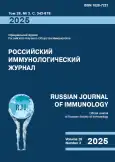Influence of cytokines on macrophage tolerance to lipopolysaccharide
- 作者: Erdyneeva D.B.1,2, Nikiforov N.G.1,3, Verkhova S.S.1,4, Orekhov A.N.1, Kulagova T.A.5
-
隶属关系:
- Research Institute of General Pathology and Pathophysiology
- Moscow Institute of Physics and Technology (National Research University)
- Institute of Gene Biology, Russian Academy of Sciences
- B. Petrovsky Russian Research Center of Surgery
- Research Institute for Nuclear Problems, Belarusian State University
- 期: 卷 28, 编号 3 (2025)
- 页面: 381-386
- 栏目: SHORT COMMUNICATIONS
- URL: https://journal-vniispk.ru/1028-7221/article/view/319872
- DOI: https://doi.org/10.46235/1028-7221-17192-IOC
- ID: 319872
如何引用文章
全文:
详细
Macrophages have great significance in immune response, being important participants in innate immunity. They are capable of both directly and indirectly fighting pathogens by regulating the surrounding cells via biologically active substances. In response to various stimuli, macrophages may switch from basal step to a pro- or anti-inflammatory state, polarizing into the M1 or M2 phenotype. M1 macrophages have a pro-inflammatory phenotype, being activated under the influence of cell wall lipopolysaccharide from Gram-negative bacteria, or some pro-inflammatory cytokines. M2 macrophages acquire an anti-inflammatory phenotype upon activation of some immune response receptors (Fcγ and TLR), cytokines IL-4, IL-13, IL-10 and other stimuli. Macrophages are also capable of alleviating their immune response depending on the duration and/or frequency of inflammatory signal, thus developing immune tolerance effect. Of particular importance is tolerance to bacterial lipopolysaccharide, when the macrophages acquire refractoriness to repeated stimulation compared to the primary one, producing less cytokines and chemokines. The aim of our study was to assess the role of cytokines and chemokines CCL2, CXCL1, CXCL9, CXCL12, IL-1b, IL-4, IL-6, IL-7, IL-8, IL- 15, IL-22, TNFα on immune response of macrophages to lipopolysaccharide and emergence of immune tolerance. Primary monocytes were obtained from venous blood of healthy donors. E. coli lipopolysaccharide (LPS) was used to stimulate monocytes and differentiated macrophages. We have shown that pre-treatment of primary human macrophages with recombinant cytokines IL-4 and TNFα enhances the inflammatory response to repeated stimulation with lipopolysaccharide, i.e. weakens the development of tolerance. This effect was expressed as increased production of cytokines (TNFα, IL-6, IL-10) and IL-8 chemokine in presence of recombinant IL-4, and TNFα production with recombinant TNFα. At the same time, recombinant IL-4 was also able to enhance the inflammatory signal of macrophages upon a single LPS stimulation, thus increasing the TNFα and IL-8 secretion. We have shown that some cytokines may affect the tolerance of macrophages to LPS. This phenomenon may involve transition of macrophages from one polarization state to another, or to an intermediate step. Modulation of macrophage phenotype and its immune response opens the way to the development of new therapeutic approaches to inflammatory diseases, where tolerance to lipopolysaccharide plays a significant role in pathogenesis, such as sepsis and atherosclerosis.
作者简介
Daiana Erdyneeva
Research Institute of General Pathology and Pathophysiology; Moscow Institute of Physics and Technology (National Research University)
编辑信件的主要联系方式.
Email: daya-na@mail.ru
ORCID iD: 0000-0003-2279-0157
Senior Laboratory Assistant, Laboratory of Angiopathology, Postgraduate Student
俄罗斯联邦, Moscow; Dolgoprudny, Moscow RegionNikita Nikiforov
Research Institute of General Pathology and Pathophysiology; Institute of Gene Biology, Russian Academy of Sciences
Email: nikiforov.mipt@googlemail.com
ORCID iD: 0000-0002-2082-2429
PhD (Biology), Researcher, Laboratory of Angiopathology, Junior Researcher of Core Facility Center
俄罗斯联邦, Moscow; MoscowSvetlana Verkhova
Research Institute of General Pathology and Pathophysiology; B. Petrovsky Russian Research Center of Surgery
Email: verxova.svetlana@gmail.com
ORCID iD: 0000-0002-7953-0586
Senior Laboratory Assistant, Laboratory of Angiopathology, Postgraduate Student
俄罗斯联邦, Moscow; MoscowAlexander Orekhov
Research Institute of General Pathology and Pathophysiology
Email: ano.inat@mail.ru
ORCID iD: 0000-0002-6495-1628
PhD, MD (Biology), Head, Laboratory of Angiopathology
俄罗斯联邦, MoscowTatyana Kulagova
Research Institute for Nuclear Problems, Belarusian State University
Email: tatyana_kulagova@tut.by
ORCID iD: 0000-0002-1113-7323
PhD (Biology), Researcher, Laboratory of Nanoelectromagnetism
白俄罗斯, Minsk参考
- Collins P.E., Carmody R.J. The regulation of endotoxin tolerance and its impact on macrophage activation. Crit. Rev. Immunol., 2015, Vol. 35, no. 4, pp. 293-323.
- Ferlito M., Romanenko O.G., Ashton S., Squadrito F., Halushka P.V., Cook J.A. Effect of cross-tolerance between endotoxin and TNF-alpha or IL-1beta on cellular signaling and mediator production. J. Leukoc. Biol., 2001, Vol. 70, no. 5, pp. 821-829.
- Gillen J., Ondee T., Gurusamy D., Issara-Amphorn J., Manes N.P., Yoon S.H., Leelahavanichkul A., Nita-Lazar A. LPS tolerance inhibits cellular respiration and induces global changes in the macrophage secretome. Biomolecules, 2021, Vol. 11, no. 2, 164. doi: 10.3390/biom11020164.
- Gorabi A.M., Kiaie N., Khosrojerdi A., Jamialahmadi T., Al-Rasadi K., Johnston T.P., Sahebkar A. Implications for the role of lipopolysaccharide in the development of atherosclerosis. Trends Cardiovasc. Med., 2022, Vol. 32, no. 8, pp. 525-533.
- Italiani P., Boraschi D. From monocytes to M1/M2 macrophages: phenotypical vs. Functional differentiation. Front. Immunol., 2014, Vol. 5, 514. doi: 10.3389/fimmu.2014.00514.
- Italiani P., Mazza E.M., Lucchesi D., Cifola I., Gemelli C., Grande A., Battaglia C., Bicciato S., Boraschi D. Transcriptomic profiling of the development of the inflammatory response in human monocytes in vitro. PLoS One, 2014, Vol. 9, no. 2, e87680. doi: 10.1371/journal.pone.0087680.
- Li H., Breedijk A., Dietrich N., Nitschke K., Jarczyk J., Nuhn P., Krämer B.K., Yard B.A., Leipe J., Hauske S. Lipopolysaccharide tolerance in human primary monocytes and polarized macrophages. Int. J. Mol. Sci., 2023, Vol. 24, no. 15, 12196. doi: 10.3390/ijms241512196.
- Park S.H., Park-Min K.H., Chen J., Hu X., Ivashkiv L.B. Tumor necrosis factor induces GSK3 kinase-mediated cross-tolerance to endotoxin in macrophages. Nat. Immunol., 2011, Vol. 12, no. 7, pp. 607-615.
- Quero L., Hanser E., Manigold T., Tiaden A.N., Kyburz D. TLR2 stimulation impairs anti-inflammatory activity of M2-like macrophages, generating a chimeric M1/M2 phenotype. Arthritis Res. Ther., 2017, Vol. 19, no. 1, 245. doi: 10.1186/s13075-017-1447-1.
- Stout R.D., Jiang C., Matta B., Tietzel I., Watkins S.K., Suttles J. Macrophages sequentially change their functional phenotype in response to changes in microenvironmental influences. J. Immunol., 2005, Vol. 175, no. 1, pp. 342-349.
- Vidyarthi A., Khan N., Agnihotri T., Negi S., Das D.K., Aqdas M., Chatterjee D., Colegio O.R., Tewari M.K., Agrewala J.N. TLR-3 Stimulation Skews M2 Macrophages to M1 Through IFN-αβ Signaling and Restricts Tumor Progression. Front. Immunol., 2018, Vol. 9, 1650. doi: 10.3389/fimmu.2018.01650.
补充文件










